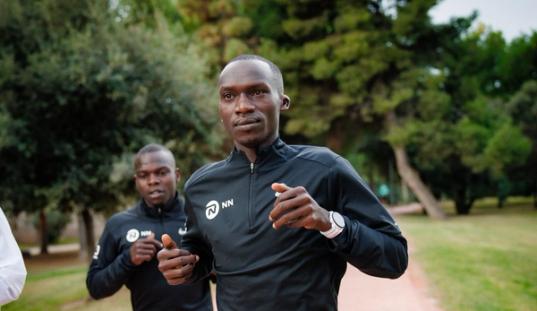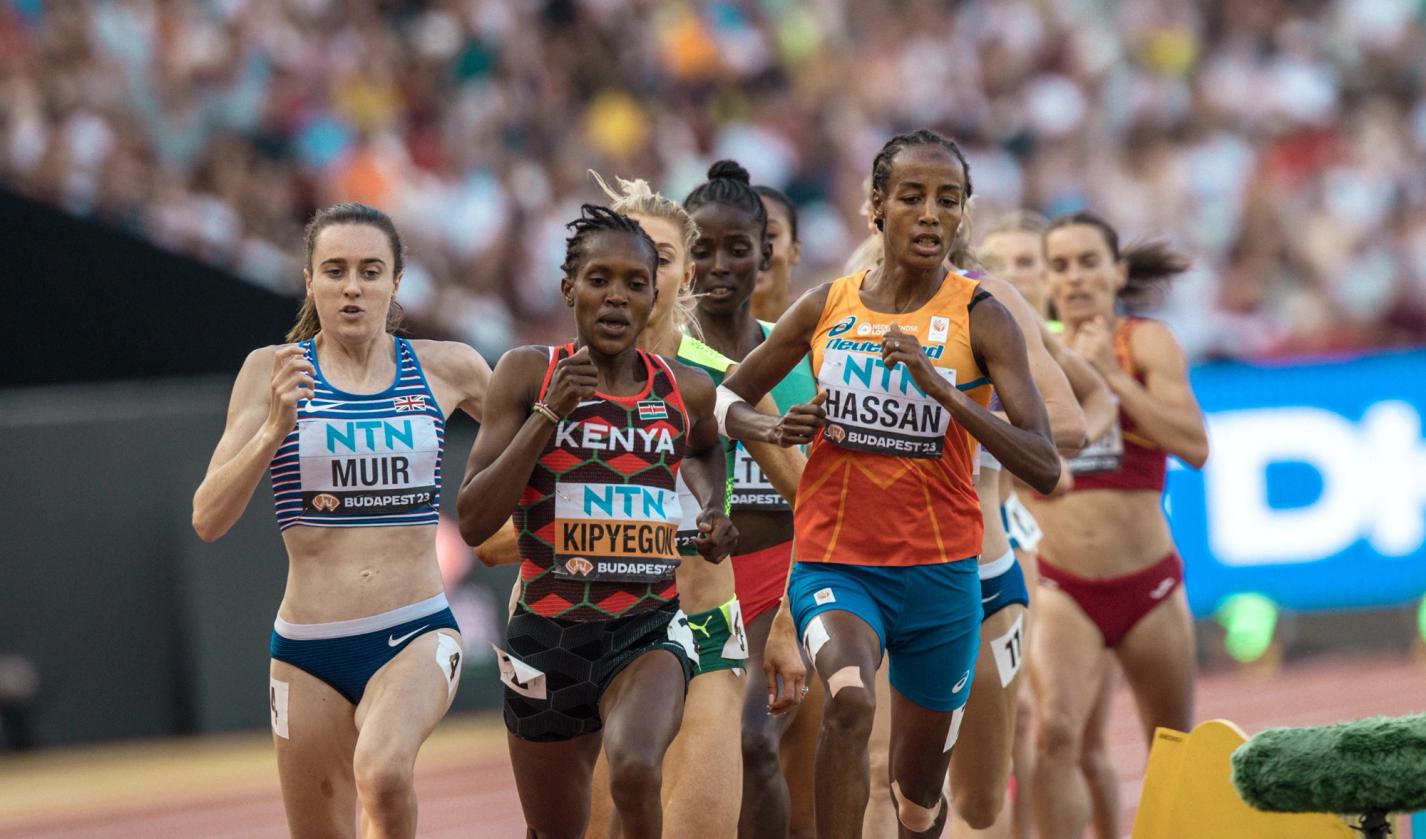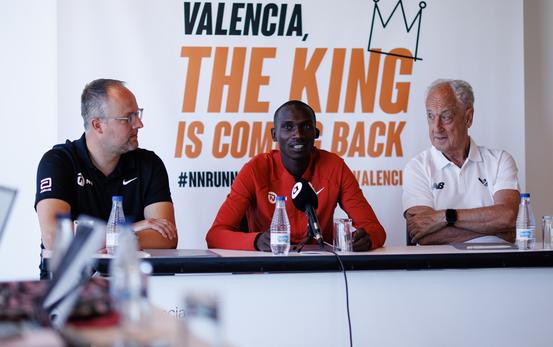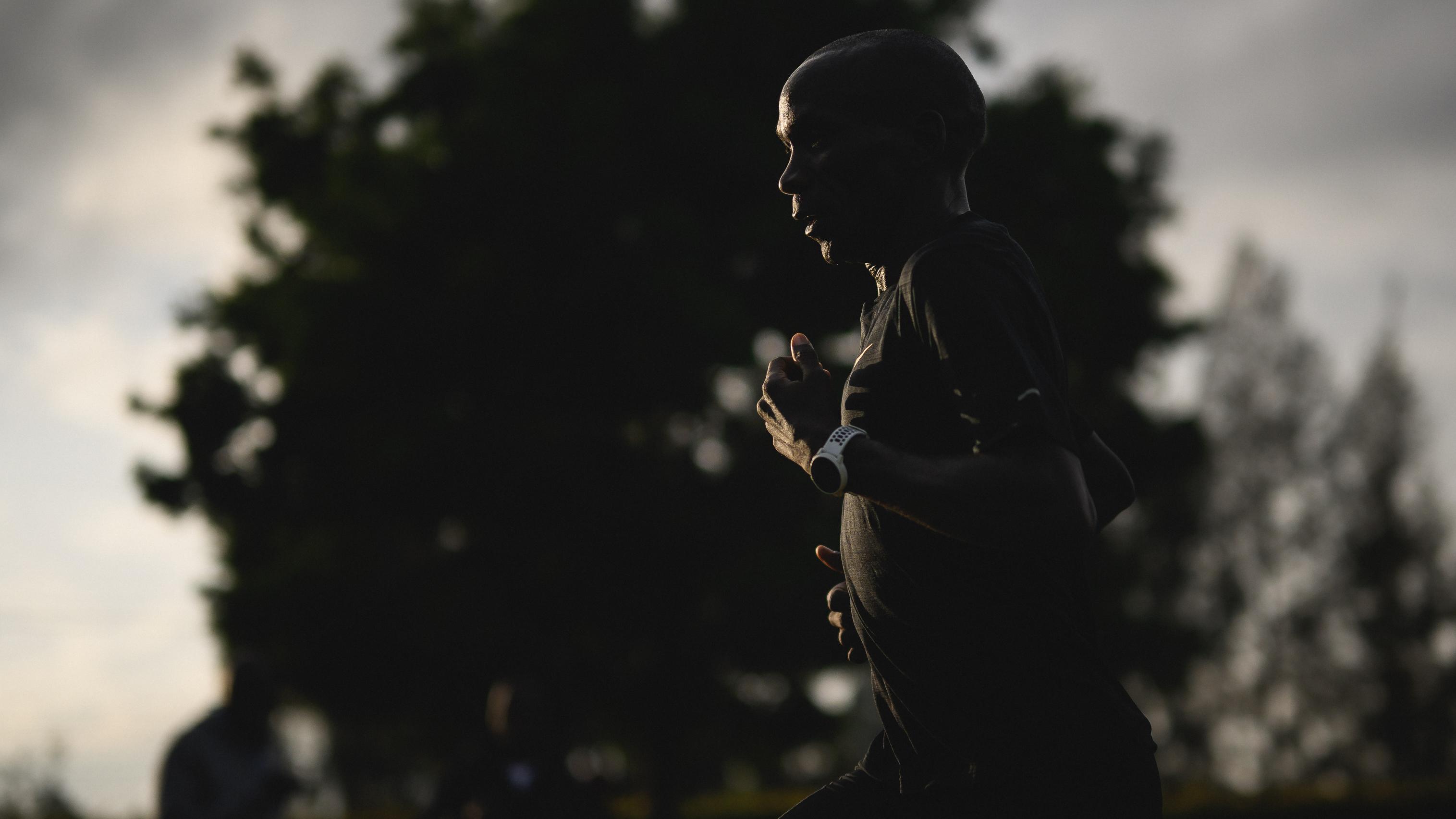By Owen Corbett
December 1, 2023
This Sunday in Valencia, Joshua Cheptegei is taking the next step in his illustrious career. And then he’ll take another step. And then a whole lot more of them as he makes his marathon debut. His move up in distance at this point in his career follows in the footsteps of past distance running greats, who shifted from domination on the track to the siren song of the 26.2. Cheptegei’s medal collection and catalog of world records already make the 27-year-old Ugandan the best true distance runner of his generation, but how he fairs in the marathon will weigh heavily in the inevitable comparisons to the greatest male distance runners of all time. Below we break down the résumés Cheptegei is chasing, attack the ‘GOAT’ debate from every angle possible, and hopefully only get sidetracked a few times in the process.
The Contenders
Although it may not be the most entertaining event in track and field, the 10,000m is the ultimate distance event. Middle-distance runners have turned the 5,000m into a sprint, and with an ever increasing emphasis on footwear and fueling, the marathon has become more science than sport. The 10,000m however remains the perfect compromise between speed and strength. With that in mind, a look into the history books shows four names combining for 14 of the past 16 world titles and six of the last seven Olympic titles at the distance. In addition, no list of all-time greats could be complete without the inclusion of the greatest marathoner to ever live:
Haile Gebrselassie: The Ethiopian legend dominated the track in the 1990s, and continued to break records as he moved to the roads at the turn of the century. Gebrselassie medalled at eight consecutive global championships in the 10,000m from 1993 to 2003, even more impressive considering the event still had preliminary rounds during his peak. His success continued late into his career when at 35 he became the first man to break the 2:04 barrier in the marathon and establish one of the last of the 25 world records he set over the course of his career.
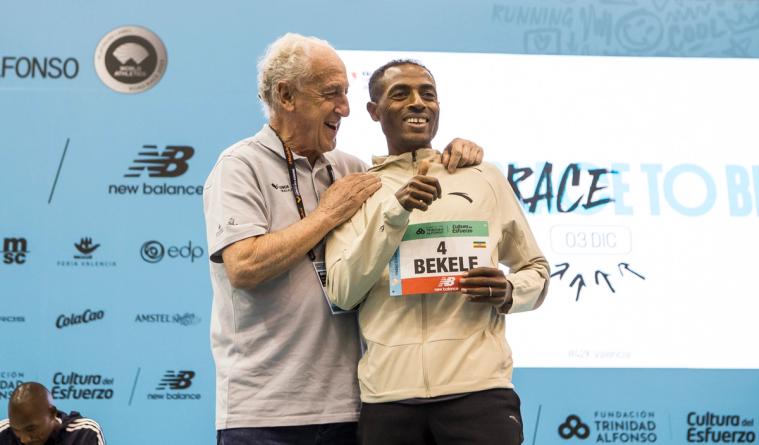
Courtesy Valencia Marathon
Kenenisa Bekele: Following in Gebrselassie’s footsteps, the younger Ethiopian matched his predecessor’s feats of four consecutive 10,000m world titles and back to back Olympic golds at the distance. Bekele however achieved a feat that Gebrselassie never could in winning 5,000m gold alongside the longer distance in 2008 and 2009. Off the track, Bekele is widely considered the greatest cross country runner in history – an 11-time world champion in the discipline, but has experienced an up and down marathon career, coming within seconds of the world record despite multiple injury issues. Sunday’s Valencia marathon may serve as a passing of the torch as the 41-year-old Bekele will square off against Cheptegei for the first time in their careers.
Eliud Kipchoge: If the question up for debate was “who is the greatest marathoner of all time?”, there would be no arguments against Kipchoge, the former world record holder who is the consensus ‘GOAT’ at the legendary distance. What often gets overlooked though is the first decade of his career. Kipchoge became a world champion at 18 years old and put up top-tier performances all the way down to 1,500m. When it is all said and done, the most impressive part of the Kenyan’s career may be his influence on the sport in the public sphere. His sub-two hour marathon attempts have brought more attention to the sport than ever before, and every time he lines up to race for the rest of his career he will make headlines – including his potential attempt at becoming the first three-time Olympic marathon medalist next year in Paris.
Mo Farah: A late bloomer relative to his fellow greats, the Somali-born Farah had a stranglehold on distance gold medals at global championships in his 30s. He took home titles in six consecutive championships from 2011 to 2017, including winning every championship 5,000m and 10,000m between 2012 and 2016. His four straight double gold campaigns is arguably one of the most impressive streaks in the history of the sport, as no other runner has achieved the feat more than twice. Farah may also have the greatest middle distance pedigree of any World Marathon Major champion. His unprecedented range is evidenced by the fact that he is the only man in history to run under 3:30 for the 1,500m and under 27:00 for the 10,000m – both of which he has done a few times throughout his career – and in 2015 he ran the times less than two months apart.
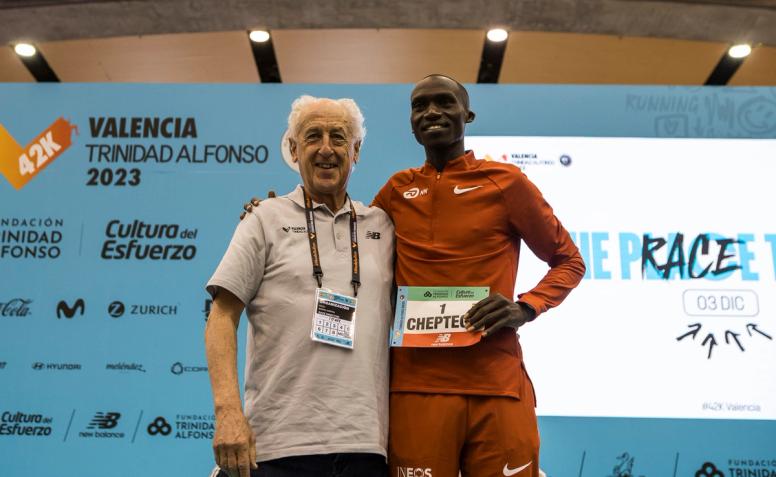
Courtesy Valencia Marathon
Joshua Cheptegei: The four names listed above comprise the “Mount Rushmore” that Cheptegei is trying to etch his way onto, and his early career résumé suggests he has the ability to do so. He has won gold at four consecutive global championships, and taken down the long-standing world records of Kenenisa Bekele, all while establishing Uganda as a distance running power in the same conversation as traditional giants Kenya and Ethiopia.
Honorable Mentions
Paul Tergat: It's difficult to be in the conversation for the greatest distance runner of all time when you are the second greatest in your own era. Tergat had an incredible career, highlighted by five consecutive world cross country titles, two world half marathon golds, and becoming the first Kenyan man to hold the world record in the marathon, but he also won a lot of silver on the track. Tergat was overshadowed by Gebrselassie throughout the 1990s, finishing less than one second behind him in two Olympic 10,000m finals, and just on his heels in three world 10,000m finals (two silver, one bronze). Overall, Tergat never beat Gebrselassie on the track in any of their nine matchups.
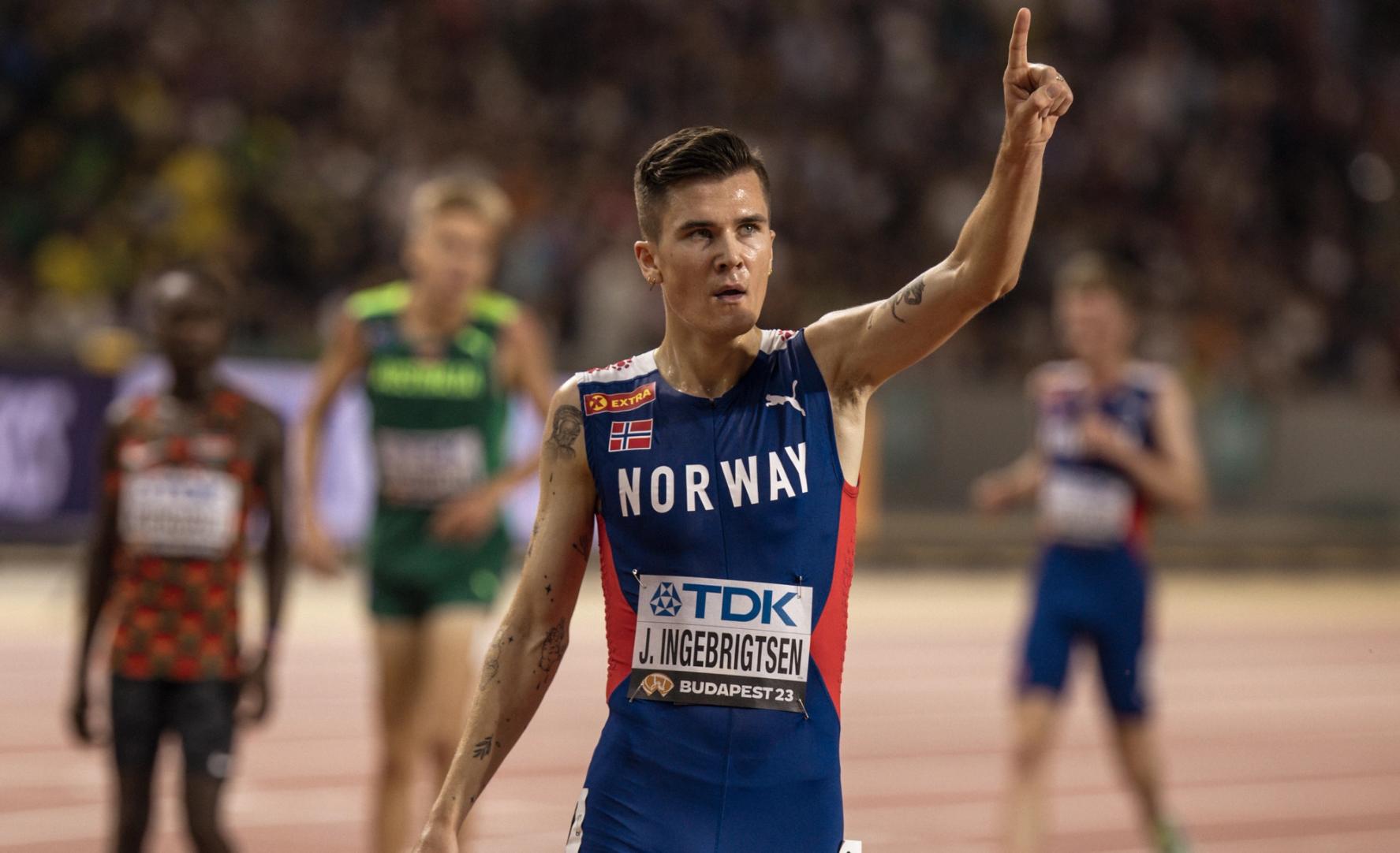
Johnny Zhang / @jzsnapz
Jakob Ingebrigtsen: When you think of everything Jakob Ingebrigtsen has accomplished in his career, it's hard to believe he only just turned 23. While the Norwegian has already worked his way into the discussion of the greatest middle-distance runners of all time, his inclusion here is based on his stated desire to break every world record from the 1,500m to the marathon before he retires. While that may sound absurd, it is his “If some people can do something, I believe I can do it better” confidence that might just get him there. Ingebrigtsen has already tallied three world records/world bests in shorter distances (2,000m, and two-mile, plus the indoor 1,500m), and has won the past two world championship 5,000m finals as a “consequence” of his training. Ingebrigtsen’s obsession with the 1,500m and mile world records – which he is closing in on – have prevented him from showing his likely capability at longer distances, and when he decides to go after those records too, it doesn’t seem wise to doubt him.
Paavo Nurmi: The “Flying Finn” won 12 medals, nine of them gold, over a span of three Olympic Games, inarguably the most dominant stretch in the history of distance running on its biggest stage. The only reason that Nurmi’s accomplishments are not held beside those of Gebrselassie, Bekele, and Kipchoge is because his medals were won nearly a century ago. Nurmi’s medal collection includes team and individual titles in cross country, and as well as gold in the 3000m team event, none of which have been offered since the 1924 Paris Games. What can’t be discounted however is the degree to which Nurmi dominated his era: for 100 years he was the only person to win the 1,500m and 5,000m finals at the same Olympic Games, and his 22 official world records may trail Gebrselassie’s 25, but only until you factor his 21 unofficial* world records into his total. While Nurmi was one of the great pioneers of distance running, he can’t be compared to today’s best as his world record times were minutes off modern top performances (14:28/30:06 for 5,000m/10,000m).
*record keeping was less intense during Nurmi’s career, for example World Athletics did not begin recognizing indoor world records – which he set 11 of – until 1987.
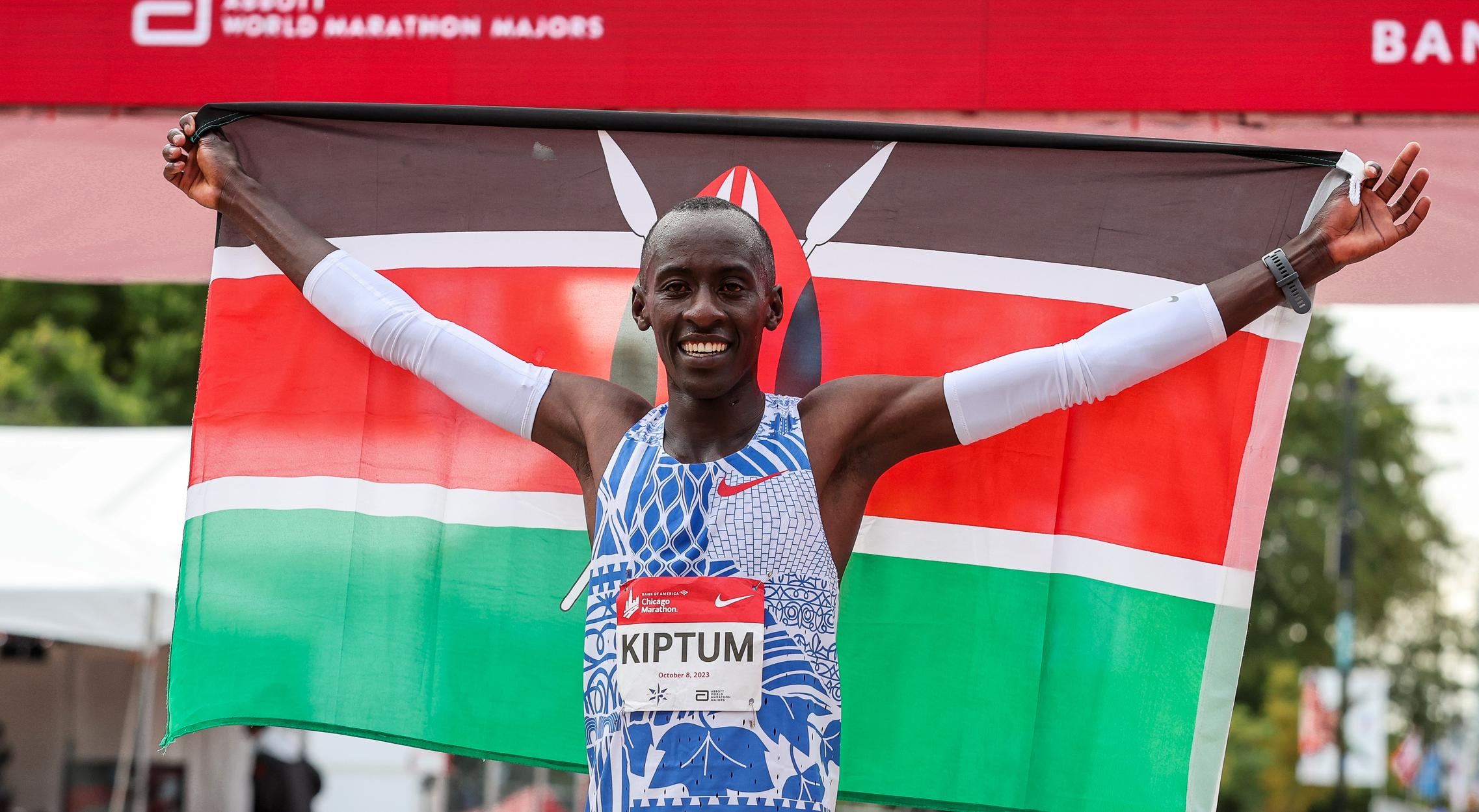
Kevin Morris / @KevMoFoto
Kelvin Kiptum: Now this may seem a little premature, but if Kelvin Kiptum is the man to bring the marathon world record under two hours, his name will be etched in history books. While Kiptum will likely never be considered the greatest all-around distance runner in history due to a nearly non-existent track résumé, he has done things in his first three career marathons that seem inhuman. His ability to supplant Kipchoge as the greatest marathoner of all time will likely depend on his longevity, something his own coach has admitted worried about with his intense training regimen. If he can manage a long enough career, the Kenyan – whose somewhat controversial listed birth date would make him just 24 years old this weekend – could take the marathon to places never before imagined.
Now that you know the names, it's time to get into the numbers. We’ll use five categories to help you make up your mind, buckle up, here we go!
Championship Performance
Haile Gebrselassie:
- Two-time Olympic medalist
- 10,000m - Two gold
- Seven-time World Championships medalist
- 10,000m - Four gold, one silver, one bronze
- 5,000m - One silver
- Four-time World Indoor Championships medalist
- 3,000m - Three gold
- 1,500m - One gold
- Two-time World Cross Country Championships medalist
- Senior Race - One bronze
- Junior Race - One silver
- Two-time World Junior Championships medalist
- 10,000m - One gold
- 5,000m - One gold
- World Half Marathon Championships medalist
- One gold
Total = 18 medals (12 gold)
Gebrselassie set championship records early on in his career, starting with a pair in the 1992 World Junior Championships at the 5,000m and 10,000m, winning the latter by nearly 43 seconds. At the World Championships the next year, his senior debut, he bested the former championship record by over ten seconds, but was beat out for gold by Kenya’s Ismael Kirui. In 1995, a few months after his first world record over 10,000m, he set a world championships record at the distance by over 20 seconds en route to gold. Just one year later Gebrselassie broke the Olympic 10,000m record in 1996 by 14 seconds. His World Indoor Championships record in the 3,000m from 1997 still stands today, and no winner has come within three seconds of his 7:34 mark. A model of consistency, Gebrselassie medalled in 15 of the 17 global finals he lined up for on the track, the only two exceptions being his fifth and sixth place finishes at the end of his track career in the 2004 and 2008 Olympic Games.
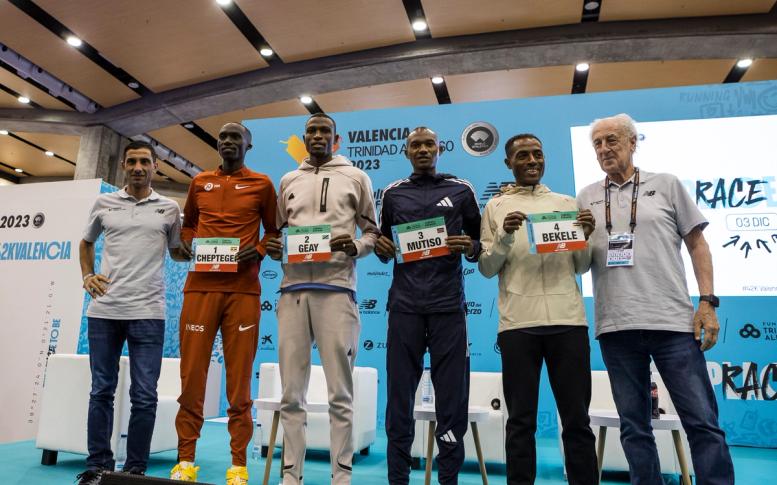
Courtesy Valencia Marathon
Kenenisa Bekele:
- Four-time Olympic medalist
- 10,000m - Two gold
- 5,000m - One gold, one silver
- Six-time World Championships medalist
- 10,000m - Four gold
- 5,000m - One gold, one silver
- World Indoor Championships medalist
- 3,000 - One gold
- Thirteen-time World Cross Country Championships medalist
- Long Race - Six gold
- Junior Race - One gold
- Short Race - Five gold, one silver
- World Junior Championships medalist
- 5,000m - One silver
- World Youth Championships medalist
- 3,000m - One silver
Total = 26 medals (21 gold)
At just 23 years old, Kenenisa Bekele had already become the first athlete to win Olympic, World Outdoor, World Indoor, and World Cross Country titles, a feat that has gone unmatched since. His Olympic records in the 5,000m and 10,000m (12:57/27:01) from the 2008 Beijing Games still stand today, and he also holds the second fastest 10,000m in Olympic history from four years earlier. In the 2003 World Championships 10,000m final he ran a record 26:49, defeating the world record holder Haile Gebrselassie for the first of four consecutive wins at the distance. At the end of that streak, now the world record holder in his own right, Bekele rebroke his record to the tune of 26:46, a mark that still stands as the championship record today. In 30 races that Bekele has run with a global medal on the line, he has taken home gold in over two thirds of them, and been on the podium in all but four: he finished fourth in the 10,000m at the 2012 Olympics (one second behind his brother for bronze), he dropped out of the 2007 World Cross Country Championships in 90 degree heat, he dropped out of the 10,000m in the 2011 World Championships (his first race on the track in nearly two years due to injuries), and he finished ninth in the junior race at the World Cross Country Championships as a 16-year-old.
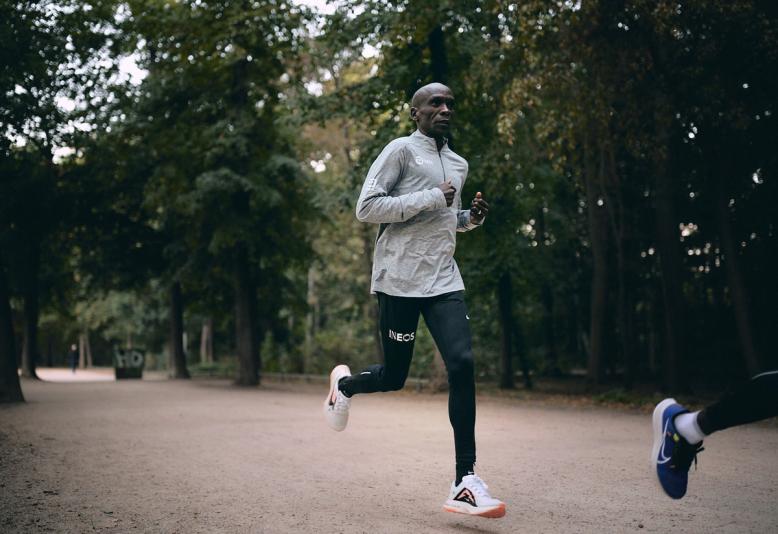
Credit to NN Running Team
Eliud Kipchoge:
- Four-time Olympic medalist
- Marathon - Two gold
- 5,000m - One silver, one bronze
- Two-time World Championship medalist
- 5,000m - One gold, one bronze
- World Indoor Championships medalist
- 3,000m - One bronze
- World Cross Country Championships medalist
- Junior Race - One gold
Total = Eight medals (four gold)
At just 18 years old, Kipchoge started the 2003 season by winning his first global title in the junior race at the World Cross Country Championships. Just five months later in the 5,000m final at the World Championships, he held off Kenenisa Bekele and Hicham El Guerrouj – the greatest middle distance runner of all time – for the win in 12:52, which still stands as the fastest 5,000m time in World Championship history two decades later. In 15 global finals across the track, roads, and grass with a medal on the line, Kipchoge finished lower than fifth only twice and never lower than seventh. He also has a silver medal from the 5,000m final in the 2010 Commonwealth Games, a race he lost by just seven-hundredths of a second.
Mo Farah:
- Four-time Olympic medalist
- 10,000m - Two gold
- 5,000 - Two gold
- Eight-time World Championship medalist
- 10,000m - Three gold, one silver
- 5,000m - Three gold, one silver
- World Half Marathon Championships medalist
- One bronze
Total = 13 medals (10 gold)
Farah’s first medal on the global championship stage didn’t come until his breakout at the 2011 World Championships when he was already 28 years old. From that point on he medaled in 13 of his 14 championship appearances – taking gold in ten of them – with the lone exception being a fourth place finish in the 3,000m final at the 2012 World Indoor Championships: a sprint finish where he ended up one hundredth of a second from bronze, two hundredths of a second from silver, and within half a second of the win. Before this stretch however, he competed in 13 global championships from 1999 to 2010, and put together a collection of solid, but far from spectacular results. His struggles included failing to make the final of the 5,000m at the 2008 Olympics, finishing 74th in his World Cross Country senior debut in 2003, and finishing 59th at the junior race two years earlier. Even in major competitions on the continental scale, Farah failed to stand out until later in his career. His win in the 5,000m final at the 2001 European Junior Championships was his only major title until he took gold in the 2006 European Cross Country Championships.
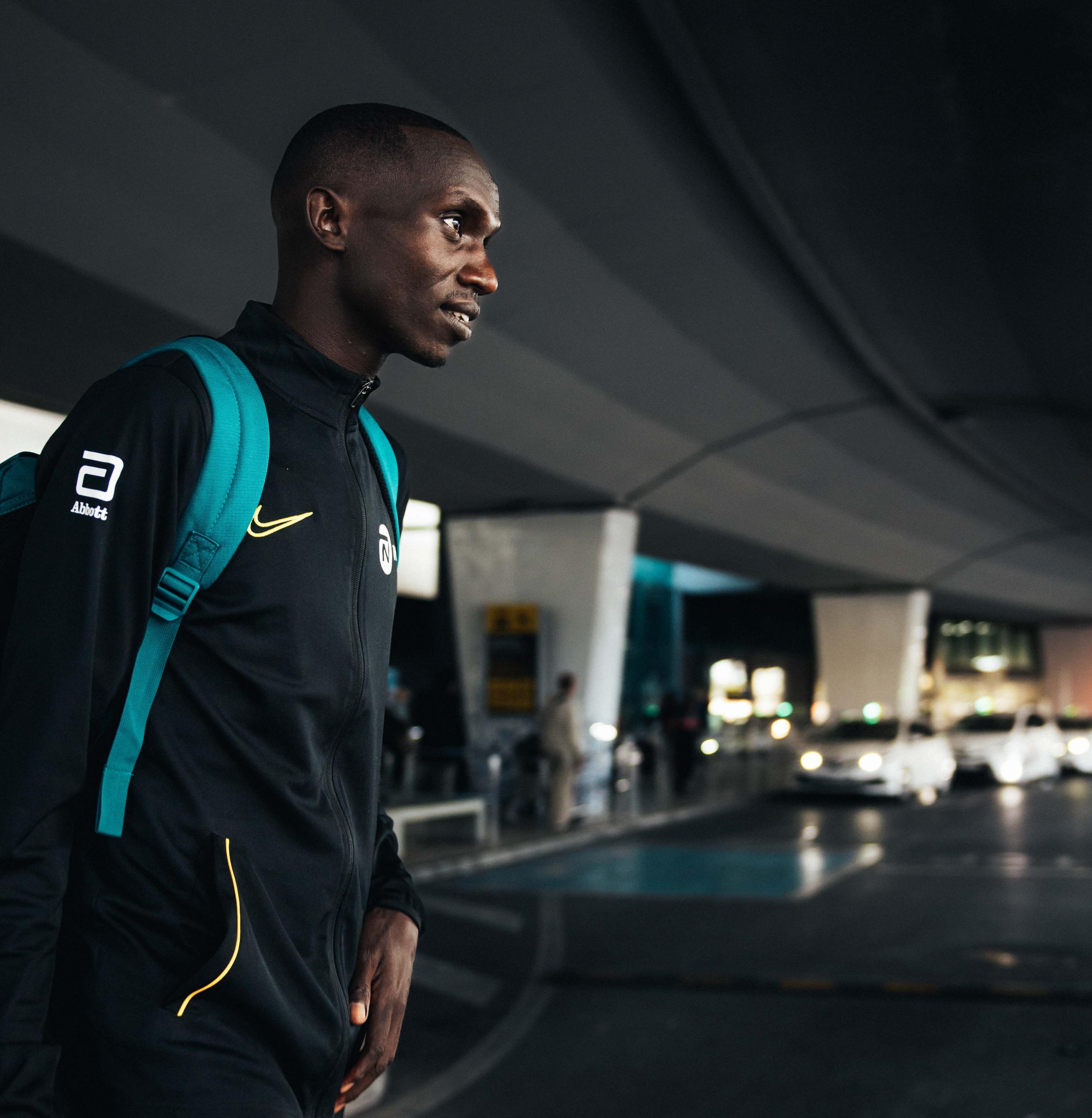
Courtesy Valencia Marathon
Joshua Cheptegei:
While Cheptegei has consistently performed up to a world-class standard on the biggest stage in recent years, it is hard to say that he has ever truly been dominant. His career winning percentage is just over 50%, but even if we pinpoint his 2018 to 2022 peak, his 70.9% victory rate trails the success that Gebrselassie maintained over his entire career. An aside, it may seem strange to call Cheptegei past his prime in a year he won a world title, but the 10,000m final in Budapest is the only race he has won this year in five tries. It’s certainly possible however that his transition to the roads could lead to a second career peak that extends well into his 30s.
Head-to-Head:
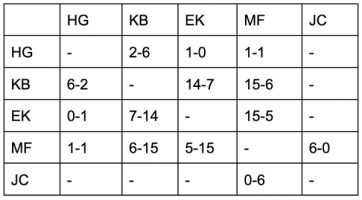
Notes:
- Gebrselassie
- Holds an overall losing record, but all of the losses came after he turned 30
- Bekele
- Undefeated in four 10,000m races against Gebrselassie
- Lost both marathon matchups to Farah
- Kipchoge
- Lost 12 of 15 career matchups against Bekele on the track, but has won all four in the marathon
- Farah
- Finished 58 spots and more than three minutes behind Bekele in the 2001 World Cross Country Championships Junior Race
- Finished 73 spots behind Bekele in the 2003 World Cross Country Championships Short Race
- Finished 36 spots and more than two and a half minutes behind Bekele in the 2005 World Cross Country Championships Senior race
- Finished 15 places and over 50 seconds behind Bekele in 2005 London Grand Prix 5,000m
- Finished 16 places behind Kipchoge in the 2008 Ostrava Golden Spike 5,000m
- Has won all six matchups against Cheptegei over 5,000m/10,000m
- Cheptegei
- Has a chance for his first win over anyone in the group on Sunday against Bekele
*preliminary rounds of championship races not included in any calculations
Longevity
Haile Gebrselassie:
With a professional career that stretched from age 17 to age 42, Gebrselassie was able to remain at the top of the sport for well over two decades. He burst onto the scene early in the 1990s with an impressive amount of junior accolades, highlighted by gold medals in the 5,000m and 10,000m finals at the 1992 World Junior Championships, both in record time. He also enjoyed a significant amount of early success on the senior level with seventh and third place World Cross Country Championships finishes, and a gold medal in the World Championships 10,000m final, all before the age of 21. Gebrselassie remains the youngest 10,000m world champion to date, which he followed up with a silver medal in the 5,000m final after running two rounds of each event. His success continued all the way to the end of his career, including an age 40 season with top five finishes in all five of his races, three of which he won. Gebrselassie still holds masters records in the 10,000m (35+) and half marathon (40+), and many have speculated that he was as many as five years older than his listed age throughout his career.
Gebrselassie retired in 2015, but his impact on the sport is still heavily felt today. While he may not have been Ethiopia’s first world record holder or world champion, he put the nation firmly into the conversation of the most dominant countries in the sport. Gebrselassie set 61 national records from the 800m to the marathon over the course of his career, paving the path for the country’s stars of today like Selemon Barega, the 23-year-old Ethiopian who grew up in awe of Gebrselassie and Bekele, and is the reason that Joshua Cheptegei is still looking for his first Olympic 10,000m title.
Kenenisa Bekele:
An often overlooked element of Bekele’s cross country dominance is how early in his career he was taking down more experienced runners. At 18 he won the junior race at the 2001 World Cross Country Championships, and then came back the next day to take the silver medal in the short race against a senior field. The next year, he began a five year streak of winning both the short race and long race titles, and in the majority of those years he was unchallenged. Bekele, now 41, has struggled with injuries over the last decade but has shown incredible flashes of his old self when he can put a healthy stretch together. At 37, Bekele was just two seconds off the marathon world record, and just last year he set the masters record in the marathon (40+) – although it has since been bettered. Bekele claims he hasn’t yet reached his peak in the marathon, and wants to run his first Olympic marathon next year in Paris. This weekend in Valencia will be a crucial step in his path to qualifying for Paris and securing a spot on the Ethiopian team. He’ll have to revert his recent struggles, as he hasn’t finished a race in over 14 months, and hasn’t crossed the finish line first in over three and a half years.
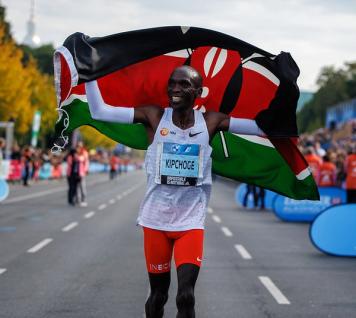
Kevin Morris / @KevMoFoto
Eliud Kipchoge:
Kipchoge’s unprecedented achievements well into his 30s have been well documented – running the then-marathon world record of 2:01:09 at age 37 (and many believe he is actually a few years older than his listed age) – but he also enjoyed immense success in his first few years as a pro. We have already discussed his breakout 2003 season that started with a World Junior Cross Country title, which he backed up on the track by beating two all-time greats in the fastest 5,000m final the World Championships has ever seen. Just a year later however, he proved those wins weren’t a fluke with a fourth place senior finish at the World Cross Country Championships, and Olympic bronze in the 5,000m final in Athens. Kipchoge isn’t done either, after a yet another World Marathon Major victory this fall in Berlin, he enters 2024 looking to become the first man in history to win three Olympic medals in the marathon.
Mo Farah:
As we have covered, Farah saw modest success early on in his career, but was nowhere near the greatest of all-time trajectory he’d ultimately wind up on. His most impressive junior accomplishment was winning the 5,000m final at the European Junior Championships at the age of 18, but he wasn’t a factor on the global scene until ten years later. On the other end of the spectrum, Farah was more impressive on the track in his 30s than nearly every other athlete in history. He was 34 when he won his final 10,000m world title – making him the oldest ever in the category, he set the hour run world record at 37, and he was still winning major half marathons at 39. Farah retired this year at 40, which is by no means early, but Gebrselassie raced until he was 42, and Bekele and Kipchoge are still running at 41 and 39 respectively.
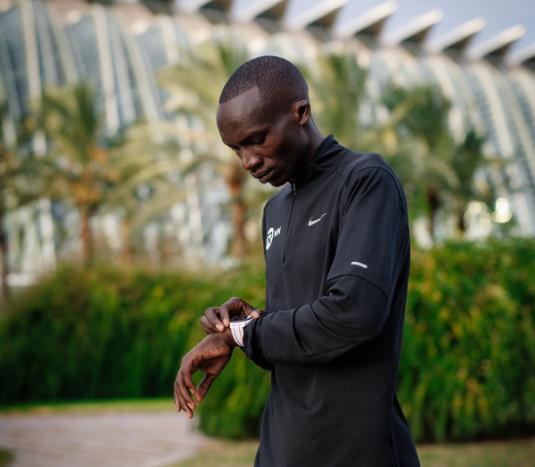
Credit to NN Running Team
Joshua Cheptegei:
This is clearly an incomplete grade for Cheptegei, as he is likely less than halfway through his career. The evidence we do have however, is promising. Cheptegei was impressive as a junior, easily winning the 10,000m final at the 2014 World Junior Championships, and made a smooth transition to the big leagues, finishing sixth in the 10,000m final at the Rio Olympics as an 18-year-old, behind only much more established runners. In terms of his long term future, Cheptegei has not had any major injury issues so far, which bodes well for his durability. Additionally, if Sunday marks a true transition to a focus on the roads, that will mean fewer races per year on his body, and as someone who is still years away from 100 career races, he should have the legs to run deep into his 30s, and potentially even longer.
The Marathon
At the end of all great long distance runners’ careers, they invariably find themselves running the marathon. It is an event that can make or break a legacy, as it leaves what is often the lasting image of the runner in fans' minds. It is the ultimate challenge, with the ultimate reward, thus deserving its own category.
Haile Gebrselassie:
Gebrselassie made his marathon debut at 29, in an off year at the 2002 London Marathon. At 2:06:35, it was the fastest marathon debut in history, an Ethiopian record that he would hold for the next 14 years, and it made him the sixth fastest man in history at the distance. The only issue with the performance was that it happened behind a world record setting run by Khalid Khannouchi, who was pushed by Paul Tergat to the finish, leaving Gebrselassie in third place, nearly a minute back from the win.
A reigning Olympic champion at the time, Gebrselassie returned to the track for one more championship cycle, before coming back to the roads full time in 2005 with a course record and personal best at the Amsterdam Marathon. The next year he won his first World Major in Berlin, becoming the fifth man in history to run under 2:06. 2007 was an up and down year for Gebrselassie as he returned to the London Marathon as the pre-race favorite, a year after claiming he ran “the worst race of his life” in the British capital, but dropped out just after 30 kilometers. His true redemption came later that year in Berlin when he broke the world record by more than 30 seconds. He would return to Germany next year and break his own record once again, becoming the first man to dip under the 2:04 barrier.
By the end of 2008, Gebrselassie had run the three fastest marathon times in history, and from 2007 to 2010, he won six consecutive marathons – not counting a promotional appearance at the 2007 Detroit Free Press Marathon where he ran only half the race just a month after his world record run in Berlin. Gebrselassie had just as much success over 13.1 miles, as he won his first eight career half marathons while setting the world record at the distance. He ended his career failing to finish three of his last four marathons after turning 37, but overall has an impressive résumé. In ten major marathons, he posted three DNFs, but also four wins, all of which were in Berlin, where he held the record for most victories until Kipchoge won a fifth title in the German capital this past fall.
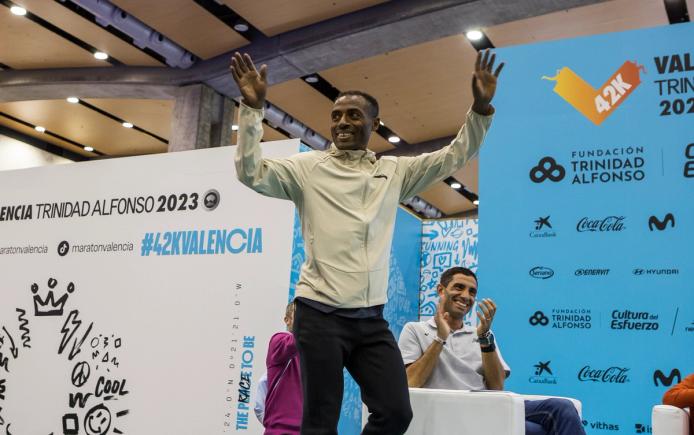
Courtesy Valencia Marathon
Kenenisa Bekele:
At 31 years old, Bekele began his marathon career at the 2014 Paris Marathon, winning in a time that ranked as the seventh fastest marathon debut in history and would stand as the course record until 2021. He won his first major marathon with an Ethiopian record of 2:03:03 at the 2016 Berlin Marathon, just six seconds off the world record. He then fell into an injury cycle, and by the end of 2018, he had just two wins to four DNFs in ten career marathons.
He made an explosive return at the 2019 Berlin Marathon once again just missing a world record, running 2:01:41, a mere two seconds off Kipchoge’s mark. This performance is what keeps hope alive in the minds of Bekele’s fans, as he remains the third fastest man in marathon history. Since then however, he hasn’t won any of the three marathons he has run, and failed to even finish two of them. In 15 career marathons, he has three wins to five DNFs, and in 11 World Marathon Major appearances, he has two wins to two DNFs. It all begs the question, what Bekele will we see in Valencia this weekend? The one who could finish within seconds of a world record, or the one who might struggle to make it to the finish line.
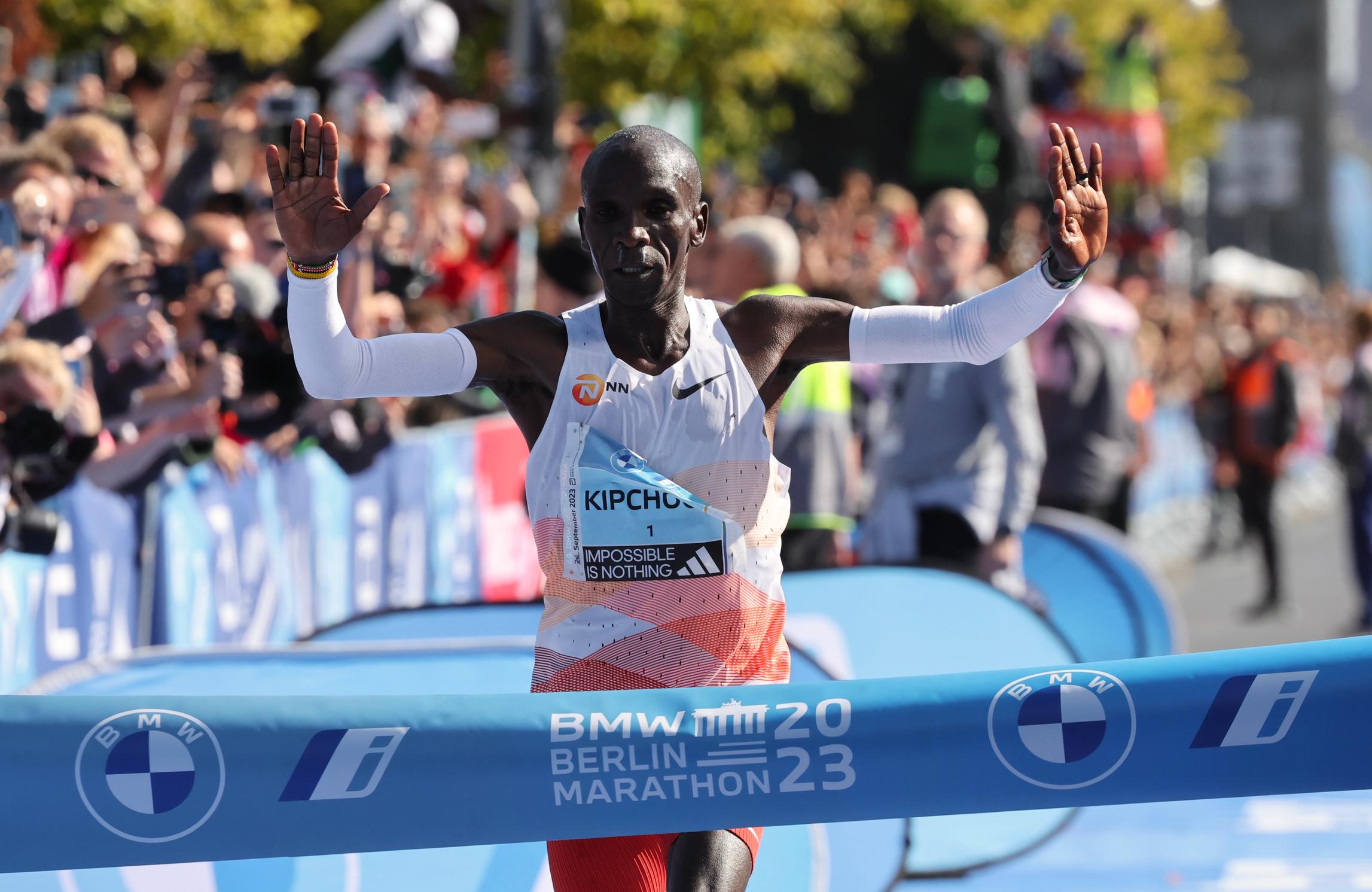
Kevin Morris / @KevMoFoto
Eliud Kipchoge:
When Eliud Kipchoge made his marathon debut at age 28 in the 2013 Hamburg Marathon, there was no obvious reason to believe that it was the start of the greatest marathon career of all time. Transitioning to the roads after a few years of struggling on the track, Kipchoge ran the seventh fastest debut marathon in history, and a Hamburg course record that lasted for nine years. His next showing at the 2013 Berlin Marathon was a little more telling of his future success – despite a second place finish. Staying on Wilson Kipsang’s world record pace through 35 kilometers, Kipchoge finished just above two hours and four minutes, becoming the fourth fastest man in history, and was the only competitor to finish within three minutes of Kipsang.
Kipchoge must not have liked the taste of his first marathon loss, because he wouldn’t suffer another defeat in the event until 2020, winning his next ten marathons. In 2016, Kipchoge began the season by missing a world record by just eight seconds in London, and then won his first Olympic title in the marathon at the Rio Games. One year later, Kipchoge was one of three athletes that Nike selected to run a marathon in a completely controlled environment, in a highly publicized effort to break the mythical two hour barrier. Although he missed the mark, Kipchoge’s time of 2:00:25 was more than two and a half minutes faster than the existing official world record, and he was the only athlete in the Breaking2 project to perform on the day, with Zersenay Tadese and Lelisa Desisa running 2:06:51 and 2:14:10, respectively.
In 2018 he set the official world record in the marathon, breaking the previous mark by over a minute, and the next year made another attempt at the two hour barrier, this time successfully, in 1:59:40. His two hour marathon attempts brought more attention to the sport of distance running than ever before: more than 500 million viewers tuned in to the INEOS 1:59 Challenge, over four times the audience of the most-watched Super Bowl. Kipchoge became a Roger Bannister-like figure, and was easily marketed with his near monastic lifestyle and inspiring “No Human is Limited” mantra.
In 2021, he bounced back from his first marathon loss in seven years by becoming the third man to defend an Olympic marathon title, and did it with the largest margin of victory in the event in nearly fifty years. After breaking his own world record at the 2022 Berlin Marathon, he held four of the five fastest times in history over the distance, not even including his unofficial attempts. Before Kelvin Kiptum took down his mark in London this year, he held course records at half of the World Marathon Majors, but his 11 wins in 14 majors in combination with his two Olympic titles, is a feat that seems untouchable. This fall, Kipchoge earned redemption from the slowest time of his career in his Boston Marathon debut by winning the Berlin Marathon for a record fifth time, and he will look to continue that momentum into 2024 as he tries to make Olympic history in the marathon.
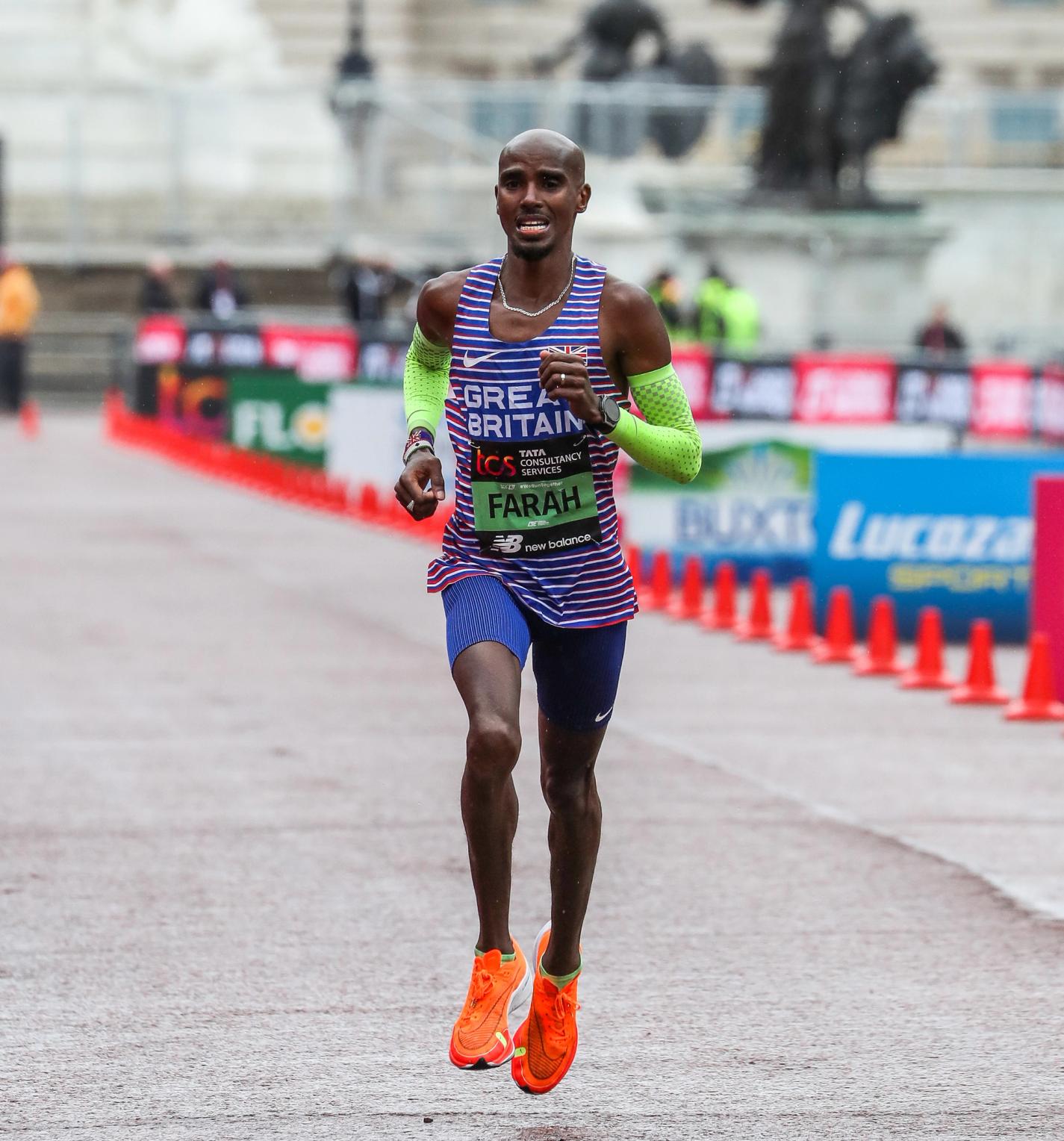
Kevin Morris / @KevMoFoto
Mo Farah:
Farah’s first foray into the marathon technically came in the 2013 London Marathon, but he entered with the intent of only running half the race. He made his official debut the next year at age 31, but he finished just eighth. He didn’t venture back to the marathon until 2018, returning to London with a podium finish and a British record of 2:06:21. A few months later he one-upped himself with his first major marathon win in Chicago and a European record of 2:05:11 – a personal best that ranked him as only the 45th fastest marathoner in history, and slots him at 112th on the all-time list today. Farah was more successful over the half marathon, winning 13 of 17 in his career, and finishing in the top three in every race until a fourth place finish in his final career race this year at the Great North Run where he once won six consecutive titles. He still holds British records over both 13.1 and 26.2 miles. All six of Farah’s career marathons were world majors, and he tallied one win, and another third place finish among them.
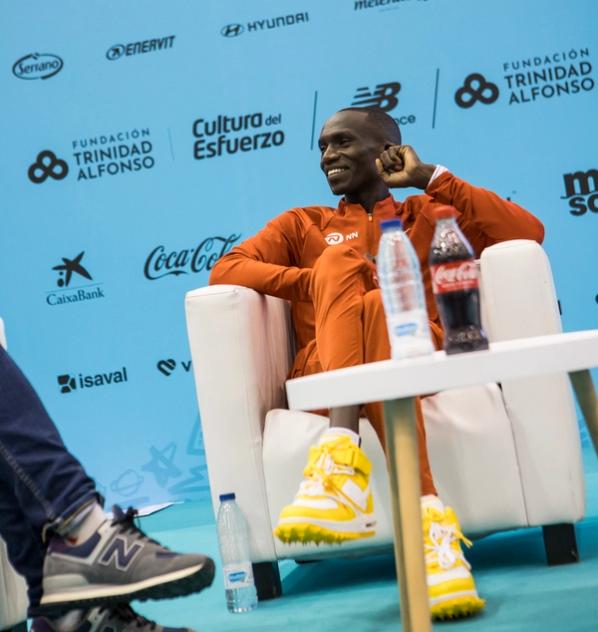
Courtesy Valencia Marathon
Joshua Cheptegei:
As stated at the top of the story, Sunday will be Cheptegei’s debut in the marathon. At just 27 years old, he will debut younger than any of his other fellow greats, which could set him up for a long, successful career on the roads. Cheptegei has already shown promise on the surface that should translate to the marathon, previously holding road racing world records over five, ten, and fifteen kilometers. Currently, the longest distance Cheptegei has ever raced is the half marathon, in which he debuted at the 2020 World Half Marathon Championships, running the 11th fastest debut over 13.1 miles in history in a championship setting, not one designed for a fast time.
Among those he lost to in his debut are his countryman Jacob Kiplimo – the world record holder in the half who may have even more promise in the marathon – and Kibiwott Kandie, the second fastest man at the distance, and whom Cheptegei will be racing on Sunday. Cheptegei and Kiplimo are in position to head an assault on the Ugandan marathon record books, as Cheptegei serves as a role model for Ugandan runners – especially Kiplimo and his brothers Oscar Chelimo and World Champion Victor Kiplangat – the same way that Gebrselassie did for young Ethiopians a quarter century ago.
As Cheptegei transitions to the marathon, many fans will wonder if the reign of “King Chep” on the track is over. And the answer seems to be that he doesn't know yet either. At a press conference in the lead up to the race, Cheptegei said his performance on Sunday will factor into his decisions for the 2024 Olympics and beyond, and he even floated the idea of a 10,000m/marathon double in Paris. The last high-profile athlete to fare well in that feat? Galen Rupp in 2016. The last to medal in both races? Mamo Wolde in 1968. The last to win both? Emil Zatopek in 1952. Some incredible company that Cheptegei would be looking to join.
Conclusion
Well, you have reached the end. Every ‘GOAT’ debate is complicated, but hopefully this has given you some fun perspective to keep in mind when you wake up to the results of the Valencia Marathon this Sunday. Now you have all the facts from every perspective, you’ve made your opinion, and there’s only one thing left to do… Go on the internet and argue with strangers about why you are right and they are wrong. Have fun!

Owen Corbett
Huge sports fan turned massive track nerd. Statistics major looking to work in sports research. University of Connecticut club runner (faster than Chris Chavez but slower than Kyle Merber).
